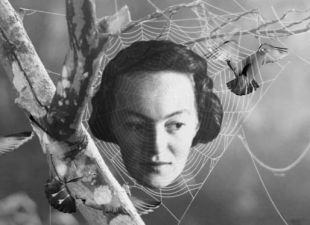
Torii – Martin Gerigk (Krefeld, Germany)
Torii 鳥居 is a short film in the form of an audiovisual composition about the traditional Shinto gates of the same name in Japan. The film uses these gates which symbolically mark the transition from the mundane to the sacred as representatives of a personal synaesthetic and spiritual journey through five levels of consciousness, traveling from existentialism to metaphysics, abstraction, and the Shinto deities called Kami, culminating in a final transition that weaves together these diverse philosophical threads. 2024; 13 min.
Joey Skaggs BioPEEP – Judy Drosd, Joey Skaggs (New York, New York)
In 1997, BioPEEP, a top-secret corporate research protocol designed to genetically alter and irreversibly addict human beings to specific products, creating “consumer junkies,” is appropriated by the government to create a new weapon, paving the way for targeted gene-ocide. That is until, in 1998, the plan is foiled by Joseph Howard (a.k.a. Joey Skaggs), a corporate whistleblower. When he leaks the information, international protests against genetic research-gone-rogue are held in Australia and the U.S., bringing attention to the plot and causing alarm in... Slovenia. This is the 10th film in the oral history series, "Joey Skaggs Satire and Art Activism, 1960s to the Present and Beyond", for which Skaggs unveils this epic international conspiracy. Is it science fiction or a vision of the future? 2024; 20 min.
WHAT IS HAPPENING? ART IN THE LIFE OF GERTIE FRÖHLICH Marieli Fröhlich (Vienna, Austria)
In 2018, director Marieli Fröhlich began to film the life story and artistry of her 88-year-old mother, Gertie Fröhlich. The film was abruptly halted by Covid and Gertie's passing in 2020. As a female director, she was motivated to complete the film and dignify the legacy of her multi-hyphenated mother's life work, which unseen powerful Patriarchal forces had systematically obscured. The creation of a singular narrative made up of edited interviews of Fröhlich's contemporaries (a virtual who's who of filmmakers, artists, and writers, including her partner Peter Kubelka), the documentary tells the story of a woman whose life was defined solely by art and her resilience within the restrictive parameters of the art world and society of the era from which she emerged. Within a historical context, her achievements are highlighted by her key role when her partner Peter Kubelka founded the Austrian Film Museum and by her curation, vision, and behind-the-scenes instigation of the seminal Galerie Sankt Stephan in 1954 in the former rooms of the legendary Neue Gallerie by Otto Kallir, to name just two. The film exposes hidden Patriarchal forces, beginning with her strict father and the Catholic priest turned art dealer, Otto Mauer, who eclipsed entirely her role in founding the influential Galerie Sankt Stephan, creating a platform for abstract artists in conservative post war Vienna, when Gertie was only 24 years old. Starting from the wartime trauma that shaped Fröhlich's childhood, her family's perilous escape from Slovakia to Austria, where, against all odds, she transformed herself from refugee status, or 'Displaced Person,' to the conduit and social enabler for much of the Viennese art world. Further explorations reveal the repressive role of the Catholic Church, chauvinistic bias in the art world and her personal life, and a lack of reciprocity from the avant-garde she did so much to promote. Throughout the documentary Fröhlich amplifies the artist's voice through recollections from her contemporaries, Gertie Fröhlich's diaries and voice-over, and the tenacious American researcher and art historian Julia Jarret, who chose Fröhlich for her published academic thesis. Stylistically Surreal montages and dreamlike footage complement the otherworldly style of Gertie Fröhlich's oeuvre. When the artist suffered a stroke in 1990, she stopped working altogether. Although incidents of late recognition, such as a gallery exhibition of her film posters at a prestigious Viennese gallery, seem to offer a chance to change her trajectory, the artist remains resigned that the credit she is due to has gone to the men she was surrounded by. The film is a testament to generational conviction to challenge the patriarchal norms of the art world, leaving an indelible mark. Confronting the contradictions surrounding female creativity, Gertie Fröhlich's timeless imagery of Goddesses offers solace and protection to guide future generations. By exploring this dynamic, the documentary unveils the systemic biases and challenges faced by women artists striving for recognition and agency. Moreover, "What's Happening?" delves into Gertie's reinterpretation of Greek myths, offering a profound analogy for her vision of a revitalized matriarchal psyche in a society where the objectification of women and the myriad of methods to have their voices silenced. In 2023, the first retrospective of Gertie Fröhlich's work opened at the Museum of the Applied Arts in Vienna, co-curated by Marieli Fröhlich. 2024; 30 min.

